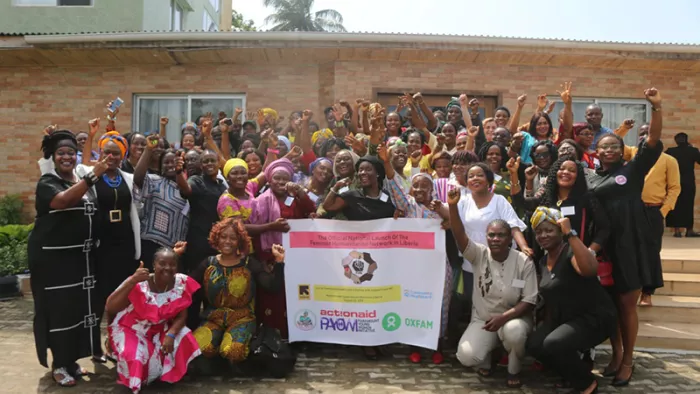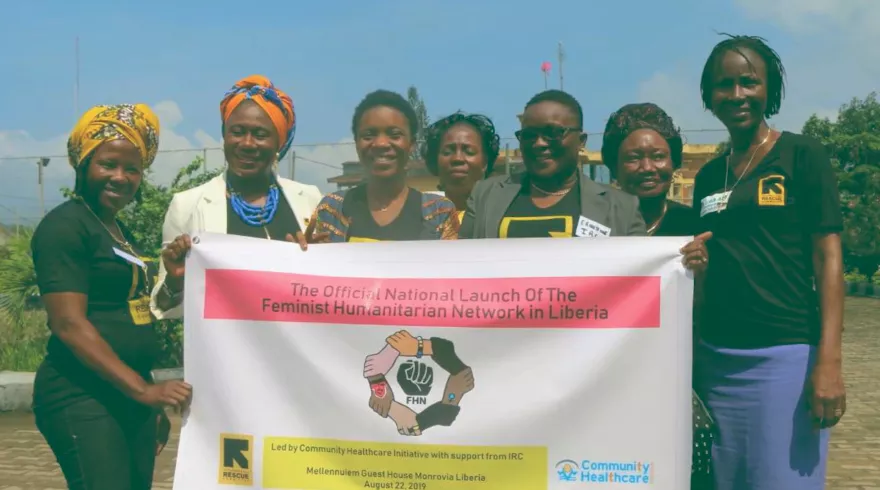
Change maker: Operates collectively
Feminist Humanitarian Network
My name is Holly and I lead the Feminist Humanitarian Network. My role is to bring members together and support the programmes as they move forward. We have been selected as Start Network's Change Maker in the category of Operates Collectively.
My name is Anu Pillay, and I’m based in South Africa, a little bit outside of Johannesburg. I’m a member of Feminist Humanitarian Network's Steering Committee, which is kind of a core group that makes decisions based on consultations with our members. Holly brings us all together and helps us work together.
(Naomi Tulay-Solanke also joined the interview later. Naomi is the founder and Executive Director of Community Health Care Initiative Liberia, which she founded after the Ebola outbreak in 2014. She is a member of the Feminist Humanitarian Network.)
Anu: The Feminist Humanitarian Network is a collective of women-led organisation around the world. We have a commitment to be 70% local organisations and 30% international. Many are individual members, but most of them are women’s rights organisations and women-led organisations. All are working in humanitarian settings, although with COVID-19, I think we can safely say that everybody is working in a humanitarian situation.
Every single country in the world now qualifies to be part of Feminist Humanitarian Network. We come together around issues pertaining to the work in the humanitarian world, but our objective is to transform the humanitarian system into working in a more feminist way with feminist principles. We want an approach that is inclusive and collaborative, and that actually acknowledges and rewards work that is done at the ground level and shifts power to that level, rather than being the top-down way that it works at the moment. In a very quick nutshell, that’s what we are about.
Holly: Anu is one of a number of women who are leaders in the humanitarian space. They came together in 2017 and had an initial series of conversations about how the humanitarian system is deeply patriarchal, and that collective action was needed to transform it into a system that was guarded by feminist principles. So, I think over a series of conversations, these women from across the humanitarian system (leaders in international organisations, women who represented women’s right organisations in the global South, women who had worked in the humanitarian system for a really long time) shared these perspectives with one another.
We’ve made a cogent decisions that 70% of members will be women’s right organisation in the global South and they will hold the power within the network, so we’re really focused on holding ourselves accountable on working in a feminist way in that way. In terms of what we are working on at the moment, everybody is responding to COVID-19 but the women’s right organisations in the network are obviously on the frontline of the response. The network is working together to support them as much as we can, but also to facilitate ongoing conversations and reflections between those members on what the challenges are, as well as how women’s organisations are working differently in the process. So at the moment, we are talking and reflecting on that, but also documenting it so that we can use COVID-19 experiences of women’s rights organisations to really push for a shift to really highlight what the challenges are in the humanitarian system and hopefully come out at the end of this crisis with something that better represents what the Feminist Humanitarian Network stands for.
Anu: I think it’s important to recognise that what prompted the Feminist Humanitarian Network was not just the fact that there was a top-down approach in the patriarchal way of working, but that there was a lot of rhetorical talk about gender equality and gender sensitivity and all of that, in a system which was actually devoid of the reality of women’s lives and a very technical approach to shifting gender inequality in the humanitarian system. So when I joined the humanitarian system about twelve to fifteen years ago, we weren’t even allowed to say the word feminism, we wouldn’t dare say “I’m a feminist”. We had to sort of go underground and be subversive about it. The Feminist Humanitarian Network is part of a big shift, a big change. We came together and we pushed as a group to shift the way that people were talking and thinking, not just wanting to solve a problem but also wanting to bring about a shift in the narrative.
You know, women’s lives were getting worse, so this is a big shift forward and I think we still face that challenge. The challenge for the Feminist Humanitarian Network is that our members are still in that system, we are still struggling against patriarchal, technical, Northern-based ways of working, which doesn’t actually mean that the power is going to shift to the local level and that people are going to make their own decisions. But what COVID-19 has done, which is one of the gains of crisis, is that it has forced the world to recognise that people at the local level do the work they always have done and will always be doing it.
Naomi: Thank you for having me, the challenges that we have had is that women have always been on the frontline responding to disaster and crisis. But what has been our major issue is that we have deliberately not structured ourselves, because we have a natural inclination to just respond. But again, there is a system called the aid system and that system says that you have to be registered, you have to do audits and all that. Not that women are not able to do that, but when we are on the front line responding, we want people to see our effort, recognise it and come and help us.
In the next ten years, with the level at which we are working, with the commitment, the passion, to Holly, to Anu and all the amazing women at the international level, I definitely see that Feminist Humanitarian Network is going to impact the humanitarian system. We are going to see more women at that highest level of decision making; we’re going to see lots of collaboration of women-led organisation; we’re going to see a lot of innovations by women-led organisation recognised.
We are going to see women-led organisations at the decision-making table articulating issues that affect them. We’re going to see communities building back better because when you invest in local actors, communities build back better because they are in power to address the issues after disasters. They are there when the disasters are happening, they are there before disaster and they remain after disaster.
We’re going to see a shift, not just within the humanitarian system but also the development system within countries. We’re going to see that people are going to be empowered to build back, people are going to own humanitarian work and not to wait for Western ideas. We are going to see local actors at the decision-making table.
So within the next ten years, the Feminist Humanitarian Network is going to positively influence the humanitarian system, and the humanitarian system is going to experience a shift, and that shift is going to be beneficial to all people. Refugees, LGBT, IQ, local women, and traditional women are going to impact their lives, and we are going to shift the economy of the world.
This article is based on an interview conducted by A Good Day in Africa. Listen to the full interview below.

